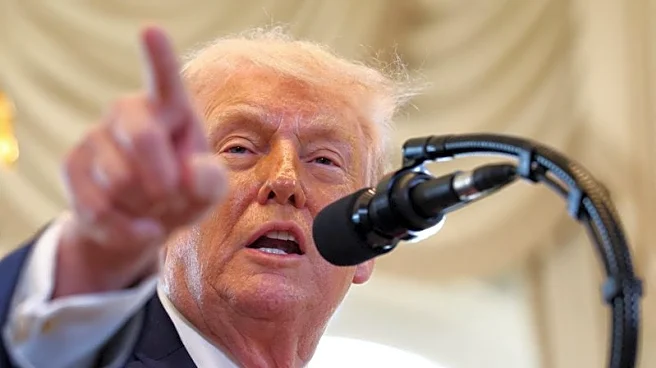Rapid Read • 9 min read
Four former Intel board members have publicly supported President Trump's criticism of Intel's CEO, Lip-Bu Tan, and are advocating for a significant restructuring of the company. They propose spinning off Intel's manufacturing arm into an independent entity to enhance America's chipmaking capabilities. This move is seen as essential to restoring Intel's competitiveness and safeguarding U.S. national security interests. The former directors argue that Intel's Foundry business, responsible for semiconductor chip production, should be separated from its other operations to address market competitiveness and strategic needs. The call for restructuring comes amid mounting pressure on Intel following President Trump's demand for Tan's resignation due to alleged ties to Chinese technology firms.
AD
The proposed restructuring of Intel could have significant implications for the U.S. technology sector and national security. By creating an independent manufacturing entity, Intel could better compete with global leaders like TSMC and Nvidia, potentially strengthening the U.S. position in the semiconductor industry. This move aligns with broader national security concerns, as advanced chip manufacturing is crucial for defense and technological superiority. The restructuring could also influence the allocation of funds under the CHIPS Act, potentially redirecting resources to support the new entity and encourage American design firms to place orders domestically. The outcome of this proposal could impact Intel's market position and the broader U.S. tech landscape.
Intel shareholders are expected to play a crucial role in deciding the fate of the proposed restructuring. The former directors urge shareholders to insist on the split, which would establish a new, independent manufacturing entity with its own leadership. This decision could lead to strategic shifts in Intel's operations and influence its competitive standing in the semiconductor market. Additionally, Intel's engagement with the Trump administration to address concerns about CEO Lip-Bu Tan's alleged ties to Chinese firms may result in further developments. The company's response to these pressures and its strategic direction will be closely watched by industry stakeholders and policymakers.
The controversy surrounding Intel's CEO and the proposed restructuring highlights broader ethical and geopolitical dimensions in the tech industry. The focus on national security and the potential influence of foreign ties on corporate leadership underscore the complex interplay between business interests and government policies. The situation also raises questions about corporate governance and the role of shareholders in shaping a company's strategic direction. As the tech industry navigates these challenges, the Intel case may serve as a precedent for how companies address similar issues in the future.
AD
More Stories You Might Enjoy












